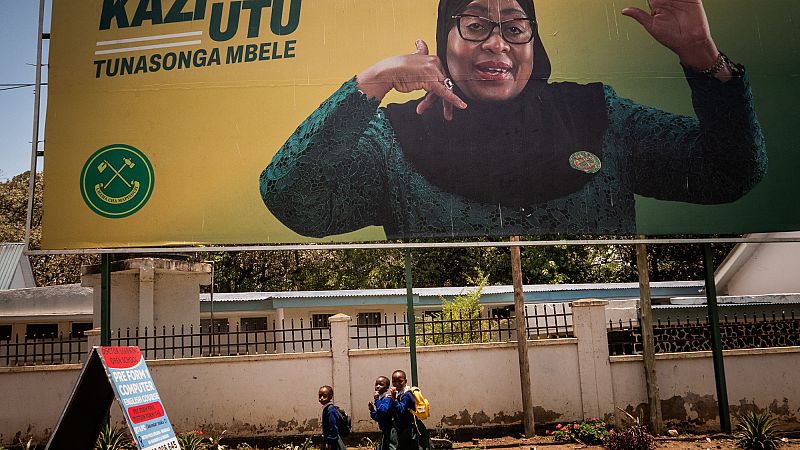Tanzania: Suluhu seeks to run 'unopposed' amid renewed political crackdown

Less than six months after Samia Suluhu Hassan was inaugurated as Tanzania's first female president in 2021, the country's most famous cartoonist depicted her in a military general's uniform under the title "Dictatoress."
In the cartoon by Tanzanian-born Gado, drawn from his base in Kenya, where there is more press freedom, Hassan looks at her image in a mirror and sees herself holding a torch — perhaps of liberty — when, in fact, she wields a spiked club.
A former vice president who rose to the presidency after the death of predecessor John Pombe Magufuli, Hassan initially gave indications that she would relax the government's repressive tactics against opposition leaders, civic groups, journalists and others.
But as Hassan seeks her first properly elected term in the October 29 elections, critics say she has defied those early hopes.
Amnesty International said in a statement this week that repression in Tanzania has "intensified" with civilian abuses ranging from arbitrary arrests to enforced disappearances and even extrajudicial killings.
Hassan's political group, Chama cha Mapinduzi (CCM), is one of Africa's longest-ruling parties. A version of CCM that maintains ties with the Chinese Communist Party has held power since independence in 1961.
Although Tanzania has yet to witness an orderly transfer of power from one party to another, regular elections featuring successive leaders of CCM have long guaranteed a measure of stability rare among neighbors in the region.
That leadership model is slowly being challenged, with the opposition party, Chadema, consistently the strongest of the groups trying to break CCM's grip on Tanzania. Chadema's popular leader, Tundu Lissu, who survived an assassination attempt in 2017, is jailed on treason charges.
Chadema has said it will not participate in elections without the reforms it says are necessary to have free and fair polling. This stance led to its disqualification by electoral authorities.
Another popular candidate, Luhaga Mpina of the Alliance for Change and Transformation-Wazalendo party, is also disqualified from running for allegedly violating his own party's constitution.
Running against opponents from smaller parties, Hassan is effectively unopposed. He will almost certainly be elected, according to Armed Conflict Location and Event Data, or ACLED, a U.S.-based nonprofit that collects data on political violence around the world.
Roland Ebole, an Amnesty International analyst, told The Associated Press that Hassan raised hopes early in her presidency with progressive measures, such as lifting a ban on opposition groups holding rallies outside the electoral season.
But Ebole said she has been just as responsible for the government's turn toward more repression since then.
When Hassan took over as president, she asserted her authority by recruiting associates who had fallen out of favor with Magufuli, the previous president.
She is said to keep a small circle of advisors, and last year she appointed her third director of the Tanzania Intelligence and Security Service, the domestic spy agency, a high turnover that some analysts saw as a sign she was in charge or trying to consolidate power.
Many Tanzanians still hope for change.
Today

